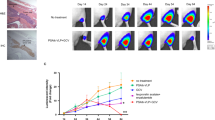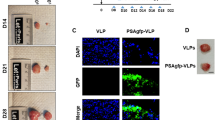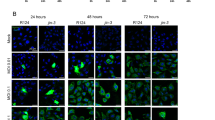Abstract
We have constructed a prostate-specific lentiviral vector based on the promoter of the prostate-specific antigen (PSA). The PSA promoter-based lentiviral vector has been used to deliver the diphtheria toxin A (DTA) gene into prostate cancer cells, and has shown promising tissue-specific eradication of prostate cancer cells in cell culture. To evaluate the efficacy of eradicating human prostate cancer cells in vivo, we used human LNCaP prostate xenografts in nude mice as an animal model and found that with a single injection of the DTA lentiviral vector into LNCaP prostate tumors, approximately 75% of the tumors (from three experiments; conducted 9/11, 11/15 and 3/4) in the animals were completely eradicated. The DTA vector has also shown the ability to cause tumor regression in recurrent prostate tumors. Intravenous injection of the DTA lentiviral vector into nude mice elicited no pathogenic effects, suggesting that this prostate tissue-specific vector is safe for eradicating prostate cancer cells in vivo.
This is a preview of subscription content, access via your institution
Access options
Subscribe to this journal
Receive 12 print issues and online access
$259.00 per year
only $21.58 per issue
Buy this article
- Purchase on Springer Link
- Instant access to full article PDF
Prices may be subject to local taxes which are calculated during checkout




Similar content being viewed by others
References
Pang S, Taneja S, Dardashti K, et al. Prostate tissue specificity of the prostate-specific antigen promoter isolated from a patient with prostate cancer. Hum Gene Ther. 1995;6:1417–1426.
Pang S, Schuur ER, Lim HY, Henderson GA, Simons JW, Henderson DR, et al. Identification of a positive regulatory element responsible for tissue-specific expression of prostate-specific antigen. Cancer Res. 1997;57:495–499.
Latham JP, Searle PF, Mautner V, James ND . Prostate-specific antigen promoter/enhancer driven gene therapy for prostate cancer: construction and testing of a tissue-specific adenovirus vector. Cancer Res. 2000;60:334–341.
Rodriguez R, Dannull J, Kaboo R, et al. Prostate attenuated replication competent adenovirus (ARCA) CN706: a selective cytotoxic for prostate-specific antigen-positive prostate cancer cells. Cancer Res. 1997;57:2559–2563.
Lu Y, Steiner MS . Transcriptionally regulated adenoviruses for prostate-specific gene therapy. World J Urol. 2000; 18:93–101.
Shi CX, Hitt M, Ng P, Graham FL . Superior tissue-specific expression from tyrosinase and prostate-specific antigen promoters/enhancers in helper-dependent compared with first-generation adenoviral vectors. Hum Gene Ther. 2002;13:211–224.
Naldini L, Blomer U, Galley P, et al. In vivo gene delivery and stable transduction of nondividing cells by a lentiviral vector. Science. 1996;272:263–267.
Naldini L, Blomer U, Gage FH, et al. Efficient transfer, integration, and sustained long-term expression of the transgene in adult rat brains injected with a lentiviral vector. Proc Natl Acad Sci USA. 1996;93:11382–11388.
Stewart SA, Poon B, Jowett JB, Xie Y, Chen IS . Lentiviral delivery of HIV-1 Vpr protein induces apoptosis in transformed cells. Proc Natl Acad Sci USA. 1999;96: 12039–12043.
Uchida N . HIV, but not murine leukemia virus, vectors mediate high efficiency gene transfer into freshly isolated G0/G1 human hematopoietic stem cells. Proc Natl Acad Sci USA. 1998;95:11939–11944.
Ericson C, Wictorin K, Lundberg C . Ex vivo and in vitro studies of transgene expression in rat astrocytes transduced with lentiviral vectors. Exp Neurol. 2002;173:22–30.
Miyoshi H, Blomer U, Takahashi M, Gage FH, Verma IM . Development of a self-inactivating lentivirus vector. J Virol. 1998;72:8150–8157.
Zufferey R, Dull T, Mandel RJ, et al. Self-inactivating lentivirus vector for safe and efficient in vivo gene delivery. J Virol. 1998;72:9873–9880.
Yu D, Chen D, Chiu C, Razmazma B, Chow Y-H, Pang S . Prostate-specific targeting using PSA promoter based lentiviral. Cancer Gene Ther. 2001;8:628–635.
Pang S . Targeting and eradicating cancer cells by a prostate-specific vector carrying the diphtheria toxin A gene. Cancer Gene Ther. 2000;7:991–996.
Dachs GU, Dougherty GJ, Stratford IJ, Chaplin DJ . Targeting gene therapy to cancer: a review. Oncol Res. 1997;9:313–325.
Ferrari G, Salvatori G, Rossi C, Cossu G, Mavilio F . A retroviral vector containing a muscle-specific enhancer drives gene expression only in differentiated muscle fibers. Hum Gene Ther. 1995;6:733–742.
Vile RG, Diaz RM, Miller N, Mitchell S, Tuszyanski A, Russell SJ . Tissue-specific gene expression from Mo-MLV retroviral vectors with hybrid LTRs containing the murine tyrosinase enhancer/promoter. Virology. 1995;214: 307–313.
Walther W, Stein U . Cell type specific and inducible promoters for vectors in gene therapy as an approach for cell targeting. J Mol Med. 1996;74:379–392.
Miller N, Whelan J . Progress in transcriptionally targeted and regulatable vectors for genetic therapy. Hum Gene Ther. 1997;8:803–815.
Riegman PH, Vlietstra RJ, van der Korput JA, Brinkmann AO, Trapman . The promoter of the prostate-specific antigen gene contains a functional androgen responsive element. Mol Endocrinol. 1991;5:1921–1930.
Schuur ER, Henderson GA, Kmetec LA, Miller JD, Lamparski HG, Henderson DR . Prostate-specific antigen expression is regulated by an upstream enhancer. J Biol Chem. 1996; 271:7043–7051.
Cleutjens KB, van der Korput HA, van Eekelen CC, van Rooij HC, Faber PW, Trapman J . An androgen response element in a far upstream enhancer region is essential for high, androgen-regulated activity of the prostate-specific antigen promoter. Mol Endocrinol. 1997;11:148–161.
Spitzweg C, Zhang S, Bergert ER, et al. Prostate-specific antigen (PSA) promoter-driven androgen-inducible expression of sodium iodide symporter in prostate cancer cell lines. Cancer Res 1999;59:2136–2141.
Lee SE, McCadden J, Ferrer F, et al. Development of a new plasmid vector with PSA-promoter and enhancer expressing tissue-specificity in prostate carcinoma cell lines. Anticancer Res. 2000;20:417–422.
Li Y, McCadden J, Ferrer F, et al. Prostate-specific expression of the diphtheria toxin A chain (DT-A): studies of inducibility and specificity of expression of prostate-specific antigen promoter-driven DT-A adenoviral-mediated gene transfer. Cancer Res. 2002;62:2576–2582.
Pan D, Gunther R, Duan W, et al. Biodistribution and toxicity studies of VSVG-pseudotyped lentiviral vector after intravenous administration in mice with the observation of in vivo transduction of bone marrow. Mol Ther. 2002;6:19–29.
Trono D . Lentiviral vectors: turning a deadly foe into a therapeutic agent. Gene Ther. 2000;7:20–23.
Reiser J . Production and concentration of pseudotyped HIV-1-based gene transfer vectors. Gene Ther. 2000;7:910–913.
Kozarsky KF, Wilson JM . Gene therapy: adenovirus vectors. Curr Opin Genet Dev. 1993;3:499–503.
Brody SL, Crystal RG . Adenovirus-mediated in vivo gene transfer. Ann NY Acad Sci. 1994;716:90–101.
Tsai SY, Schillinger K, Ye X . Adenovirus-mediated transfer of regulable gene expression. Curr Opin Mol Ther. 2000;2:515–523.
Acknowledgements
We thank Dr ISY Chen for providing the pCMVΔR8.2vprx plasmid, and W Aft for editing and preparing the manuscript.
The work described in this publication was made possible by funds received from the Cancer Research Fund under Interagency Agreement #97-12013 (University of California, Davis contract #98-00924V) with the Department of Health Services, Cancer Research Section; National Institutes of Health grant CA66022 (J-y Zheng and SP); and US Department of Defense grant DAMD17-99-1-9033 (DY and SP).
Author information
Authors and Affiliations
Corresponding author
Rights and permissions
About this article
Cite this article
Zheng, Jy., Chen, D., Chan, J. et al. Regression of prostate cancer xenografts by a lentiviral vector specifically expressing diphtheria toxin A. Cancer Gene Ther 10, 764–770 (2003). https://doi.org/10.1038/sj.cgt.7700629
Received:
Published:
Issue Date:
DOI: https://doi.org/10.1038/sj.cgt.7700629
Keywords
This article is cited by
-
Diphtheria Toxin A-Resistant Cell Lines Enable Robust Production and Evaluation of DTA-Encoding Lentiviruses
Scientific Reports (2019)
-
Rapid eradication of colon carcinoma by Clostridium perfringens Enterotoxin suicidal gene therapy
BMC Cancer (2017)
-
Challenging the roles of CD44 and lipolysis stimulated lipoprotein receptor in conveying Clostridium perfringens iota toxin cytotoxicity in breast cancer
Molecular Cancer (2014)
-
Functional verification of the diphtheria toxin A gene in a recombinant system
Journal of Animal Science and Biotechnology (2012)
-
Novel Clostridium perfringens enterotoxin suicide gene therapy for selective treatment of claudin-3- and -4-overexpressing tumors
Gene Therapy (2012)



